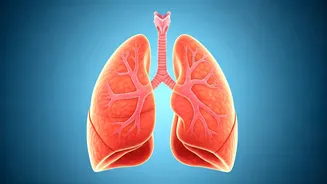Initial Assessment and Awareness
The journey to better lung health begins with a deep understanding of one's current state and a keen awareness of the environment. Initially, consulting
a pulmonologist for a thorough assessment is crucial. This helps in identifying existing conditions, risk factors, and personalized recommendations. Environmental factors significantly impact lung function; thus, minimizing exposure to pollutants, allergens, and irritants is critical. Regular monitoring of air quality indices in the area aids in making informed decisions about outdoor activities. Furthermore, establishing baseline measurements of lung capacity through spirometry tests provides a reference point to track progress as lifestyle modifications are implemented. These initial steps are the foundation for a proactive approach to respiratory health, enabling individuals to proactively manage and improve their lung function.
Dietary Strategies for Lungs
Dietary choices play a pivotal role in lung health. Consuming a nutrient-rich diet with ample fruits, vegetables, and whole grains is important. Antioxidants, found abundantly in colorful produce, combat oxidative stress and inflammation within the lungs. Vitamin C-rich foods, for example, have been linked to improved lung function. Conversely, limiting processed foods, sugary drinks, and unhealthy fats can minimize inflammation. Staying well-hydrated is also crucial, as proper hydration helps keep the respiratory system lubricated. A balanced diet should include adequate protein intake, which is essential for maintaining muscle strength, including the muscles involved in breathing. For individuals with existing respiratory conditions, consulting a registered dietitian or nutritionist can provide tailored dietary plans that support optimal lung function and overall well-being. Dietary changes coupled with other lifestyle adjustments help to optimize respiratory health and provide longevity.
Exercise and Respiratory Health
Regular exercise is another essential component of improving lung function. The aim of an exercise regime must be to increase lung capacity and overall respiratory efficiency. Cardiovascular exercises, such as brisk walking, jogging, swimming, or cycling, are particularly beneficial, as they boost oxygen intake and delivery throughout the body, including the lungs. Incorporating strength training exercises helps build and maintain the muscles needed for breathing. It's important to start slowly and gradually increase the intensity and duration of workouts, considering individual fitness levels and any existing respiratory conditions. Practicing deep breathing exercises, such as diaphragmatic breathing or pursed-lip breathing, can strengthen the respiratory muscles and improve ventilation. Regular physical activity enhances lung function, improves endurance, and promotes overall cardiovascular health, which directly supports optimal respiratory function and well-being. Proper exercise helps in efficient blood flow for the exchange of gases within the lungs.
Environmental Considerations
Environmental factors have a significant impact on lung health, making it critical to create a lung-friendly environment. Minimizing exposure to air pollutants, such as those from vehicle emissions, industrial activity, and cigarette smoke, is essential. For individuals residing in areas with high pollution levels, wearing a high-quality mask when outdoors can provide a protective barrier. Avoiding allergens, such as pollen, dust mites, and pet dander, helps reduce inflammation in the airways. Keeping the indoor environment clean and well-ventilated is also critical. Using air purifiers with HEPA filters can effectively remove particulate matter and allergens from the air. Regular maintenance of the home environment, including cleaning and proper ventilation, is necessary to minimize exposure to irritants. By carefully managing the environmental factors, individuals can significantly reduce their risk of respiratory issues and promote optimal lung function.
Smoking Cessation and Lung Health
Quitting smoking is one of the most impactful lifestyle changes for improving lung health. Smoking damages the lungs, leading to conditions like chronic bronchitis and emphysema, and greatly increases the risk of lung cancer. The benefits of quitting smoking are immediate and far-reaching, with improvements in lung function starting shortly after cessation. There are numerous resources available to support individuals in quitting, including nicotine replacement therapies, medications, and counseling programs. Seeking support from a healthcare professional or a smoking cessation specialist is highly recommended. It is necessary to develop a plan, including identifying triggers and coping strategies. Staying committed to quit can bring long-term benefits to respiratory health and overall quality of life. The cessation of smoking will allow the lungs to recover and heal, significantly reducing the risk of developing further lung diseases.












